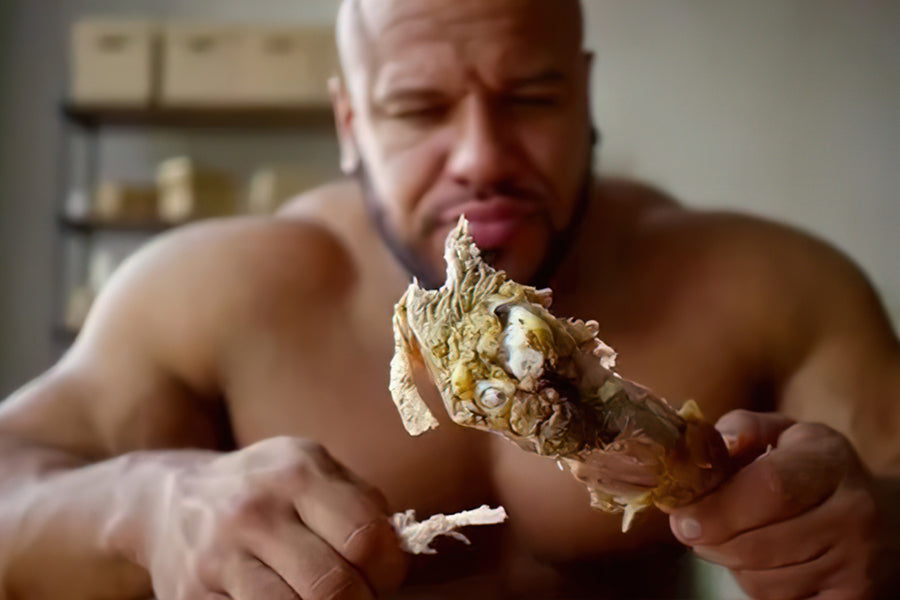Ah, "dirty bulking" - the exercise equivalent of a fast food binge. Sure, your muscles may look bigger and more defined after gorging on burgers and burritos instead of carrots and celery, but trust us: it's not good for you in the long run.
That's why it's essential to understand all the potential drawbacks of dirty bulking before diving face-first into a gallon-sized tub of ice cream.
From exploring what 'dirty bulking' actually is and the different types of approaches out there to understanding the pros and cons – after reading this blog post, you'll find yourself with a much better grasp of how effective (or not) dirtier bulks can be. Let’s get into it before cleaning your kitchen pantry for extra calories!
Related Article: Flexible Dieting - Lose Weight Without Giving Up Your Favorite Food
What Is Dirty Bulking
Dirty bulking is when someone is focused on building their physique and intentionally eats more to gain muscle. This is often achieved through consistent resistance training and a well-calculated caloric surplus.
However, "dirty bulking" refers to a more revolutionary approach where individuals consume as much food as possible without a set calorie goal, sometimes called the "see-food" diet.
Bodybuilders use this method to get enough calories and macronutrients to support their training and muscle growth. Still, it often results in significant body fat and scale weight gains.
Related Article: How to Start Eating Healthy: A Guide to the 1500-Calorie Meal Plan
What Dirty Bulking Is NOT
To clarify, it's essential to understand that "dirty bulking" does not refer to the food quality you consume. Categorizing food as either "clean" or "dirty" based on vague perceptions of nutritional value is not a practical or scientifically-supported approach.
While certain foods may be more nutritionally-dense than others, food choices should be based on individual dietary needs. Dirty bulking focuses on the amount of food consumed rather than the quality of the food itself.
Related Article: How to Gain Weight With a Fast Metabolism
What the Science Says
According to the principles of muscular hypertrophy and introductory thermodynamics, it is generally accepted that to put on muscle, a person needs to maintain a caloric surplus, which essentially means consuming more calories than they burn over an extended period.
However, while this concept may seem straightforward in theory, there is a limit to its efficacy, and simply eating more only sometimes equates to gaining more muscle.
Although chronic overeating may lead to weight gain, research has yet to determine the optimal energy surplus required for muscle growth or how much intake beyond that threshold could be considered redundant. In other words, there is no one-size-fits-all approach to this concept.
Furthermore, it is essential to note that weight gain resulting from a caloric surplus will typically include both muscle and fat, depending on the magnitude of the surplus. This phenomenon is mainly irrespective of the proportions of macronutrients (i.e., proteins, fats, and carbohydrates) consumed.
Therefore, simply increasing protein intake or "cheating" regarding macronutrient ratios will not prevent the risk of fat gain if an individual consumes excess calories.
Although consuming large caloric surpluses can increase scale weight, it is unlikely to lead to any more significant muscle gain than a more moderate approach to bulking.
In other words, simply consuming as much food as possible (i.e., dirty bulking) does not necessarily translate to more significant muscle growth compared to a more controlled approach.
An easier and quicker way to muscle growth is to add Whey Protein Supplements that promise a healthier and easier way to muscle and health.
Moreover, bulking regimens guided by a professional and controlled by the individual have resulted in more significant muscle gain than uncontrolled and unrestrained bulking diets.
While the existing body of evidence on dirty bulking needs to be completed, the current research suggests that this approach is less effective in promoting muscle gain than a diet that involves a predetermined caloric surplus.
In such cases, it is essential to take natural energy boosts like Multi-Vitamin Supplements that help increase energy and focus for better performance and health.
Benefits of Dirty Bulking
Although there is limited scientific evidence supporting the effectiveness of dirty bulking, there are still some potential benefits associated with this approach. However, it is essential to see that the more extreme a diet or meal plan appears, the more critical it is to evaluate it to determine whether it suits your needs carefully.
Covers Your Bases
Dirty bulking serves as a means to ensure that you have enough calories to gain weight. Despite this, individuals with low appetites may need a structured plan to consume enough food, even when attempting to eat as much as possible.
Nevertheless, consuming as many calories as possible daily can ensure adequate caloric and protein intake for muscular hypertrophy and enough carbohydrates to fuel workouts.
Thus, dirty bulking may serve as a viable "nuclear option" for athletes who have difficulty gaining weight despite following a structured hypercaloric nutrition plan, as long as they are willing to eat even when not feeling hungry.
Less Time Investment, Maybe
Any dietary strategy that does not require tracking your food intake, cooking meals from scratch, or measuring your servings can save you time. Although you can technically monitor these things when dirty bulking, it is not a requirement.
Dirty bulking also allows for consuming processed, frozen, or pre-packaged foods, which are quicker and easier to prepare than a well-balanced homemade meal.
However, the time saved on meal preparation may be compensated by the time spent consuming multiple additional meals, particularly if you have to force down something you don't enjoy.
More Tasty Meals
Dirty bulking provides the freedom to indulge in almost any food as frequently as desired, which can be more enjoyable for some individuals. Foods high in sugar content and fat are often more appealing to taste.
Unlike other dietary approaches, dirty bulking doesn't impose any restrictions on the type or amount of food one can consume daily. Although it may have adverse physiological consequences in some cases, this fact is noteworthy.
Potential Strength Gain
To build strength, it is essential to improve the neural efficiency of your body rather than just eating a lot. Although a high-calorie diet is crucial for fueling long and intense workouts, strength development is a skill that requires practice and not just the consumption of food.
Adding Pre Workout Supplements is essential for such matters, not only for better strength but also for energy and better workouts for bodybuilders.
Nonetheless, dirty bulking might have an indirect impact on strength gain. Generally, more prominent athletes tend to be stronger than smaller ones, and there is a positive correlation between physical size and potential strength.
However, dirty bulking can also lead to significant weight gain, which may decrease your relative strength, i.e., the amount of weight you can lift compared to your body weight. Therefore, weighing the potential benefits against the costs is essential if you consider dirty bulking for strength.
Drawbacks of Dirty Bulking
Although indulging in unlimited amounts of food and intense exercise in the gym may seem tempting as a sustainable dietary strategy, dirty bulking has its downsides. Despite its effectiveness in some situations, it will likely have several negative health consequences, regardless of how vigorously you train.
Extra Fat Gain
The most common adverse outcome of consuming more calories than your body requires is the likelihood of gaining excess fat. This is typically reflected on the scale as an increase in body weight. Although resistance training can assist in gaining lean muscle tissue, a significant surplus of calories will also increase body fat.
While some athletes may be okay with gaining extra fat, it is only sometimes a desirable outcome. More research must be done on dirty bulking to monitor how your calorie intake impacts your weight gain rate.
Potential Health Issues
While dirty bulking may help you push through intense workouts, it can also lead to adverse health outcomes. Consistently consuming excess calories and gaining weight has been linked to higher rates of depression in specific individuals.
In addition, overeating can cause discomfort and bloating and interfere with sleep patterns. It's important to note that a high-calorie diet does not directly cause these health issues, and eating more than usual may not necessarily be harmful for a limited period.
Disordered Relationship With Food
Overeating can lead to an unhealthy relationship with food. While there is a distinction between mindful eating and meticulously counting every calorie, continuously overeating can disrupt the body's natural signals for hunger and fullness. As a result, dirty bulking can make it difficult to accurately gauge satisfaction levels and distinguish between hunger and other impulses.
May Negatively Affect the Performance
Eating more food can improve your performance during exercise, but it doesn't follow a direct relationship. Some athletes prefer to exercise on an empty stomach, while others prefer to have a hearty meal before working out.
Overeating or consuming large meals with high glycemic loads can disrupt blood sugar regulation, especially for individuals with different body weights. This can cause unpredictable fluctuations in energy levels, mood, and alertness, which is undesirable when attempting a new one-rep max.
Who Should Try Dirty Bulking
While dirty bulking is a commonly known practice in bodybuilding, it should not be assumed to be fully validated or endorsed. Depending on your individual needs, it may have some relevance or usefulness.
Hardgainers, Maybe
The fitness industry often discusses the concept of a "hard gainer," a person who struggles to gain weight despite their efforts, but there is little scientific evidence to support it.
While certain health conditions such as hyperthyroidism or Type-I diabetes can make it difficult to gain weight, assuming the individual is healthy, being labeled a hard gainer typically means their weight gain doesn't match their calorie intake.
This phenomenon must be studied more, especially in individuals who lift weights or practice bodybuilding. If you're having trouble gaining weight, a short-term dirty bulk may help.
Still, it's essential to evaluate other factors like sleep quality, physical activity, and stress levels that can hinder weight change efforts. These factors can impede weight gain even if you're trying to increase your weight, and attributing it solely to being a "hard gainer" may not be accurate.
Related Article: How to Train and Diet for a Natural Bodybuilder?
Conclusion
Dirty bulking is a formula to gain muscle by eating more and getting a better physique. It can be clean and dirty depending on the food you’re consuming. It has benefits like less time investment, covering your bases, more tasty meals, and potential strength gain.
It also has drawbacks like extra fat gain, potential health issues, disordered relationships with food, and negatively affecting performance. Dirty bulking is specified for people like hard gainers, while others may do it at their risk. So choose for yourself without wasting any more time!
Reading List
Article Sources
- LEAF, ALEX, and JOSE ANTONIO. ‘The Effects of Overfeeding on Body Composition: The Role of Macronutrient Composition – A Narrative Review.’ International Journal of Exercise Science, vol. 10, no. 8, Dec. 2017, pp. 1275–96. PubMed Central, https://www.ncbi.nlm.nih.gov/pmc/articles/PMC5786199/.











